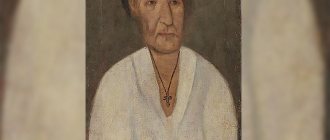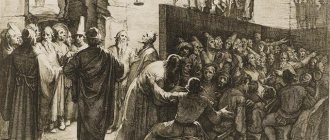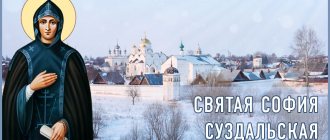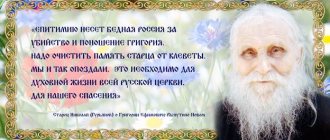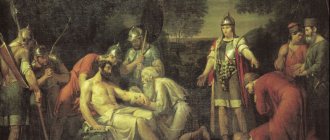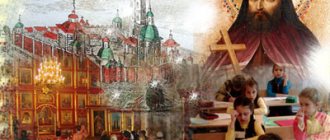Not all saints are known
We know the saints who are revealed by God - these are the people whose names we see in the calendar. The Lord focuses our attention on them, as if He is saying: pay attention to the lives of these people and take them as an example for yourself. We call them saints and believe that they are at the Throne of God, in the Kingdom of Heaven. But the names known to us from the calendar are only a small part of the saints who lived on earth. In the Kingdom of God there are a great many people whose names we do not know - for some reason they have not been revealed to us. Perhaps the saints who now live among us are also not revealed to us.
There are no similar saints, just as there are no similar people. Each of them has their own, individual path. Even if we consider the faces of holiness - those spiritual exploits for which the saints became famous - they are still all different. Let's say we take the saints. It would seem that they were all in the same rank, but none of them were the same. And among the reverends too. Moreover: if we try to build our life according to the spiritual patterns of some saint, and we manage to achieve a positive result, this will be our personal holiness.
Unmercenary
In the Orthodox faith, saints who are famous for their generosity, selflessness, and renunciation of wealth for the sake of the Christian faith are usually called unmercenaries. As a rule, these are healers, physicians, miracle workers who, when healing the sick from physical, mental and other ailments, did not take any payment. Cosmas and Damian, Cyrus of Alexandria, Panteleimon and Ermolai are just a few representatives of the unmercenary saints.
What is holiness?
Holiness is the vector of movement of human life. At the liturgy we say: “Woe are our hearts.” That is, at some certain stage of life, a person decides that the main thing in his life is to be with Christ. This is how the path of holiness begins. The believer chooses this direction and follows it. This direction is the trait that makes saints akin. And then differences begin: who follows the smooth path, who comes to holiness through desert living. One climbs the mountains, the other retires into the wilderness. You can become a saint on the battlefield or on the royal throne, by studying science or by abandoning your reason, like holy fools for Christ's sake. There are hundreds of paths, but they have one thing in common: direction. This is Christ. The saints want to be with Him.
The saints are united by devotion to God and the Church, as well as purity of heart, because without it it is impossible to see God. Appearance can be different, and so can actions in the same situations. For example, Saint John Chrysostom, when he wanted to become a monk, listened to his mother: she begged him to bury her first and then become a monk. And the Monk Theodosius of Pechersk went to the monastery without listening to his mother - she came to him and said the same words, but he remained in the monastery. The solutions are completely different, but both are holy. They found Christ and their path to Him. Another example: for Christ’s sake, a holy fool is also a king. Basil the Blessed and Nicholas II. What could they have in common? The first renounced his will and in this gained Christ. The second, when he was in danger of losing Christ, chose to lose everything external, but remain with Christ. And this unites them.
You cannot identify a saint by his clothes, manner of speaking, or education. Here on the icons is Saint Xenia of Petersburg, who lived on the street for forty-five years, and next to her is Empress Alexandra. At first glance, there is an abyss between them. Surely most people admit that if a woman takes care of herself, dresses beautifully, wears perfume, then she cannot be a saint. But then why are the Empress Alexandra and her sister, the Martyr Elizabeth, among the saints? The presence of expensive perfume does not mean that a person cannot be a saint. He has his own path, which the Lord put him on. But when a test comes, a person needs to give up something in order to remain with Christ - and he refuses it.
Saints - who are they? And why do we need such God’s “guides”?
Estimated reading time: 13 minutes.
Where do saints come from? How do they help people? Is this really possible, and why do we need such “guides” of God? - Thomas magazine asked about all this priest Konstantin PARKHOMENKO , cleric of the St. Petersburg diocese, author of several books published by the Olma Press and Publishing House "Neva".
Priest Konstantin PARKHOMENKO
Father Constantine, let's talk about who the Orthodox Church generally calls saints. For example, Protestants consider as saints all who became disciples of Christ. In confirmation of this, words from the Gospel are cited, for example: “... and now you are holy,” etc.
Only God was always called a saint. An ancient prophet, raptured to heaven, sees the Throne of God in heaven, Angels fly around and cry: “Holy, Holy, Holy, Lord of Hosts...” A person or some religious object can be holy only if God imparts holiness to them, if God will introduce you to His Holiness.
So, holy means God. It is the one in whom God acts and does His work. In the highest sense, this is the one in whom, as Holy Scripture and Tradition say, God was “represented.”
It is in the latter sense that Orthodox Christians understand this word today. You will hardly find an Orthodox person who will say that he is a saint. This is at least immodest. On the contrary, the more righteous a person is, the more obvious it is to him that a huge distance separates him from God, from God’s purity, righteousness, and holiness.
But in ancient times, for example in the Old Testament, the people of Israel were called holy. Not because the Jews were righteous and pure, but because they were the people of God. As God told the people when the Jews came out of captivity in Egypt and approached Mount Sinai: “Therefore, if you will obey My voice and keep My covenant, then you will be My inheritance above all nations, for the whole earth is Mine, and you will be My kingdom. priests and holy people." And a little later the command: “... sanctify yourself and be holy, for I (the Lord your God) am holy.”
The fact that Israel was the people of God, as if separated, cut off from the number of other nations, allowed it to be called a Holy people.
Later, Christians adopted this name. They, as the successors of Old Israel, moreover, as true worshipers of God, who recognized His Son, called themselves a holy people, saints. He also calls his disciples saints. Paul in his epistles.
And when in the Creed we call the Church Holy, this does not mean that the Church consists of holy people, but that it is the Church of God. The holiness of the Church and its members is given by God.
Father Constantine, what significance can it have in heaven to be canonized on earth? Is it really possible here on earth to decide something for sure and not make a mistake?
Of course not. It is precisely in order “not to make mistakes” that the Church is in no hurry to canonize, that is, to officially glorify some ascetics as saints.
Church canonization is only a confirmation of what happened long ago in heaven.
To canonize a person, it is necessary that he... has already died. Only by following his life, his feat until his death and seeing how he died, can one understand whether this man was really a righteous man.
And after death, it is necessary that the holiness of this ascetic be confirmed... by God. How is this possible? These are miracles that emanate from the grave or remains of a saint, or occur in response to prayer to him.
Little popular veneration. It is necessary that a number of miracles confirm the fact that the saint is next to the Lord, he is praying for us!
After the death of St. Seraphim there were a lot of such messages. The same can be said about the life of the holy righteous John of Kronstadt, blessed Xenia of St. Petersburg and other saints.
I know many people who talked about amazing miracles in their lives that happened through prayers to St. John of Kronstadt, Blessed Xenia, St. Seraphim of Vyritsky, Blessed Elder Matrona and other saints long before their official canonization.
At the Seminary, our teacher Tatyana Markovna Kovaleva told such an incident from her childhood. During the blockade, her mother greatly revered Blessed Xenia. There was a terrible famine, my mother was assigned to collect cards for the whole house, and one day she lost all these cards.
Imagine! Losing the cards of the entire house - yes, this was sabotage in those days, execution! What to do? She left her daughter and ran to the Smolensk cemetery to pray to Blessed Ksenia. Tatyana Markovna was then 10 years old. She’s sitting at home and suddenly there’s a knock. Who's there? - Open up, baby. On the threshold is a woman in a knitted sweater and green skirt, without outerwear, even though it is frosty outside. “Isn’t it you who lost it?” and gives Tanya the cards... And how many other such cases happened during the war years! And Blessed Ksenia was canonized only in 1988.
The question arises: why, in this case, is church canonization needed? It is not the saint who needs it, but us! This is like confirmation that the path of life of a saint is the path of a true son of the Orthodox Church, this is the right path!
Saints are not canonized in order to add something to their heavenly status; this is not some kind of church reward; they have already received everything from God. Saints are canonized as examples for other Christians.
Readers of the magazine “Thomas” who do not come to church sometimes ask: why pray to God through intermediaries, through saints? Will the merciful Lord really not hear me anyway? And indeed, it is difficult to imagine how a “strict” God is persuaded and begged by some saint especially close to Him, and the Lord changes His decision based on these prayers.
The best answer to this question will be the opinion of the Lord Himself, which we find in the Holy Scriptures.
Here is the Old Testament. The story of the sufferer Job. Everything that happened to him was a test of his spiritual strength and trust in God. But friends come to Job and accuse him of immorality, which brought sorrow upon him. And then the Lord becomes angry with his friends. Their words are false and feigned. These people are trying to measure God’s plan with their minds, trying to calculate God’s actions. The Lord, knowing very well the purity of Job’s life, angrily says to one of his comrades, Eliphaz: “My anger burns against you and against your two friends because you did not speak about Me as truly as My servant Job.” And then the Lord commands his friends to repent, make a sacrifice and... ask for Job’s prayers: “And my servant Job will pray for you, for only his face will I accept, so as not to reject you” (Job 42:8).
Here the Lord Himself commands to ask for the prayers of the righteous.
In the 20th chapter of the book of Genesis, the Lord exhorts Abimelech, king of Gerar, to ask for the prayers of Abraham: “... for he is a prophet and will pray for you, and you will live...” (Genesis 20: 7).
The psalmist David also speaks unequivocally about the prayer of the righteous: “The eyes of the Lord are on the righteous, and His ears are open to their cry” (Ps. 33:16). And in the book of the prophet Jeremiah we read the following bitter testimony: “And the Lord said to me: even though Moses and Samuel appear before Me, My soul will not bow to this people; drive them (the wicked Jews) away from before Me” (Jer. 15:1).
And is there any doubt that God listens to His righteous if He Himself affirms: “I will glorify those who glorify Me” (1 Sam. 2:30)?..
The New Testament also contains many indications of the power of the prayers of the righteous. Apostle Peter: “The eyes of the Lord are on the righteous, and His ears are open to their prayer” (1 Peter 3:12). Apostle James: “The fervent prayer of a righteous man avails much” (5:16). And further - examples: “Elijah was a man like us (that is, an ordinary person like us), and he prayed with prayer that there would be no rain: and there was no rain on the earth for three years and six months. And he prayed again: and the sky gave rain, and the earth brought forth its fruit” (James 5: 17-18). For up. James, it is quite obvious, undoubtedly, that the righteousness of life, let's say - the holiness of life, allows a person to perform miracles.
Can God cancel the sentence over people, the people through the prayers of the saints? Many facts of Holy Scripture and Tradition testify to this. Remember, Abraham begged the Lord, who appeared in the form of three strangers, to spare Sodom and Gomorrah.
Why is that? In the Holy Fathers we find the following thought: Christ promises that His followers will be given divine grace: “Father, the glory that You have given Me I will give to them” (John 17:22). If a person works together with God to transform the world, cleanse it from sin, and bring it to God, we can say that the person becomes a friend of God, a co-worker. Is it possible to assume that the Lord is deaf to a person who has given his whole life to Him, dedicated himself to the Lord?.. Such a person has the right to ask for others, and to ask persistently, not as a slave or an unfaithful servant, constantly betraying his master, but as a son.
We believe that there is no death as the disappearance of the soul; that after physical death a person’s soul continues to live an even more spiritually active life. This means that what prevents us from helping the deceased righteous man after his departure from this world, after his relocation to heaven?
In the book of Revelation of John the Theologian, we read about the remarkable vision of the seer: “Twenty-four elders fell before the Lamb [that is, Christ], each having a harp and golden bowls full of incense, which are the prayers of the saints” (Apoc. 5:8), and, a little later: “And the smoke of incense ascended with the prayers of the saints from the hand of an Angel before God” (Rev. 8:3-4).
At first glance, the custom of the Orthodox Church to pray to special saints on some special occasions seems strange and somewhat pagan. It is clear, for example, why in family troubles you resort to the help of St. Xenia the Blessed. But why, for example, if you have a headache, go to John the Baptist?
— There are undoubtedly excesses in this. We can say that some saints, even during their earthly lives, helped people in certain situations. These are holy healers, for example, the Great Martyr Panteleimon, the unmercenaries Cosmas and Damian, the martyrs Zinaida and Philonilla, etc. After resigning from earthly life to heavenly life, these ascetics will help sick people. They were given a gift from God; it is not taken away even after death. The Church believes so, and in the ancient rite of the Sacrament of Unction (otherwise the Blessing of Anointing, the Sacrament of Church Healing) the names of these holy doctors appear.
There are other saints who help with certain needs. Warrior - to warrior, missionary-navigator - to sailor, traveler, etc.
But there are far-fetched examples that do not correspond to any sound logic. John the Baptist, who had his head cut off, is believed to help with headaches. Another saint helps against caterpillars, mice, Colorado beetles and other reptiles of fields and vegetable gardens... Some pious brochures contain long lists of such highly specialized heavenly helpers. But this does not correspond to either the Orthodox faith or the experience of the Church; this is pious amateur activity.
Although, you know, about ten years ago such an interesting incident happened to me. Then I was a novice seminarian, in some ways zealous, in others naive. I was traveling on a train with a man whose teeth hurt terribly. He had some kind of suppuration in his gums, everything was swollen, he did not sleep for several nights. And he was on his way to surgery. Here he sits with a bandaged cheek, swaying and humming something. I felt so sorry for him! I say: “Maybe I should bring you some water?” He nods. I went to the titan to get some water, and then I remembered that when you have a toothache you pray to Saint Antipas. And I prayed to him. To my shame, I will say that I didn’t even really believe in this idea, I just felt very sorry for the man, and I prayed with all the strength of this pity. I crossed the water, gave him a drink... And then - well, just a miracle happened. After about five minutes he says: “Strange. I don't feel any pain at all." And then he lay down and fell asleep peacefully. The next day the swelling subsided. I don’t know what happened to him next, he left in the morning... That’s it.
Every person has several favorite saints. You turn to them more often in prayer, you light candles for them. But there are many other icons in the temple, and even more different saints. Are we not “offending” others with our inattention? There is an opinion that all the saints, together with the Mother of God, form in heaven, as it were, a single body that glorifies God and prays to Him. What is the point of approaching “your” icons specifically? What is the meaning, in general, other than one’s own habit, of the custom of kissing icons and lighting a candle in front of them? You can often hear: “Well, I went to church before the exam, lit a candle, and passed well.”
I'll start with the last one. There should be no magic in relation to God. If you didn’t light a candle for this saint, didn’t bow to him, didn’t kiss the icon, he’ll punish you and stop helping you. Such an attitude is unworthy of a Christian.
We must understand that first of all, God needs our burning desire to be genuine Christians. The Lord knows our life circumstances, who has what kind of workload, who has what opportunity to pray, and so on. Therefore, we must sincerely not be lazy to attend divine services, try to pray, learn this... But if we couldn’t, we were late for a reason beyond our control, the Lord will never be angry.
However, we still have a very tenacious magical attitude towards the Church. If a student was once helped by a candle, he will think that if he doesn’t light the candle, he will immediately fail the exam.
I'll tell you one case. In our church at the Theological Seminary on the eve of each exam, for those who wish, a prayer service is served in front of the miraculous icon of the Mother of God. So we ask the Mother of God to help us take the exam successfully. A seminarian I know, a classmate of mine, somehow realized that he had become internally dependent on these prayers. He was afraid that if he missed such a prayer service, he would do poorly. And then he stopped going to prayer services for some time. He prayed in his room, asked for help, but did not go to the prayer service. After some time, when he realized that he had internally freed himself from fears, he again began going to prayer services.
But we digress. The question is, why do we single out some saints?.. There is nothing bad or strange about this. Many saints are close to us in their spiritual make-up, character, temperament, church service, and ascetic deeds. Of course, we feel a special attraction to such saints. We want to know about them, read their lives, and prayerfully communicate with them.
In my life there were many such discoveries that were precious to me. This, of course, is the holy righteous Father John of Kronstadt, Blessed Xenia, St. Seraphim of Sarov, St. Sergius of Radonezh. When I entered the Seminary, I experienced great help from the spiritual patron of our Seminary and Academy, Apostle John the Theologian. In my second year at Theological Seminary, I picked up a book about St. Simeon the New Theologian and simply “fell in love” with this man. I can say the same about the king and psalmist David, the martyr Justin the Philosopher, saints John Chrysostom, Gregory the Theologian, Maximus the Confessor, Gregory Palamas, Blessed Matrona, and many others.
By our “attention” to some saints, we, of course, do not offend other saints. Where saints are, there are no petty grievances, wounded pride, or anything else. But, of course, if we somehow single out certain saints in particular, we should not forget that each saint of the Church is a unique and beautiful person, ripe for God. One should strive to learn about other saints, study their lives, and peer into the features of their feats.
What does a “strong” saint mean? That is, it is assumed that there are “not very strong”? At my house I have butter from the relics of St. Alexander of Svir. This oil really has a strong, pronounced medicinal property. But not with any oil you notice such an effect. Why is this happening?
There is no such thing as a “strong” saint in the Orthodox Church. Every saint, if we sincerely turn to him for help, helps. The same can be said about holy oil (oil) from the relics or lamp of a saint, about some holy objects.
Here, too, I can give an example from my seminary youth. Suddenly I developed eczema. I didn't know what to do. It spread further and further, already taking away entire areas of the skin. And my friend had oil from Athos, from some miraculous icon of the Mother of God. He simply kept it in a glass jar. I tell him: “Listen, give me some oil.” I went to the akathist to the Mother of God, prayed, then had a special, “spiritual” dinner at home, anointed the affected areas with this oil and went to bed. And from the next day I began to notice a clear improvement. Then it really shocked me...
But, of course, now I try to rarely use holy objects, only in extreme cases.
Any crumb, drop of shrine can bring great grace. And on the contrary, you can have dozens of particles of relics, oil, holy water at home, but this will not bring any spiritual benefit if we do not strive with all our hearts, with all our souls, with all our strength towards God.
After the revolution, a special department was created in the GPU to combat religion. It was headed by E. Tuchkov. This man caused enormous evil to the Church; he condemned to death hundreds of now glorified new martyrs. Note that meetings with people, at least one of which would have been a great honor for us, a spiritual revelation, did not have any influence on Tuchkov. His heart burned with hatred of God and the Church and was closed to grace.
In general, any shrine can bring us spiritual benefit if we accept it with reverence. And no shrine, even the greatest, can melt the ice if a person does not want it, because God respects our freedom...
Announcement illustration -
How to recognize saints?
By actions. As one saint of God writes, each of us can become a miracle worker for a while on any day; to do this we need to act against our nature. What is a miracle? - this is when an object that has certain properties suddenly does not show them. For example, if we hit a stone and it turns out to be soft, this is a miracle, because the nature of the stone is different: it should be hard. So is man. You have been insulted, and nature requires you to respond in the same way. But if a person remains silent, he will act against his nature, which requires aggression and revenge. Wanting to be with Christ, he cannot offend the image and likeness of Christ, he tries not to succumb to temptation - and for a moment he succeeds. This is holiness. Yes, after this there may be falls, difficulties in fighting one’s passions, but the reluctance to do evil reveals a person’s holiness. If you encounter a person and he responds to evil with good, know: he exhibits qualities that are called the fruits of the Holy Spirit. This means that this person is on the path of holiness. Yes, he is not a saint yet, but he is on the way to it. He fights for holiness, tries to realize it in his life.
It is very useful to read the lives of the saints who lived before us: how they built their lives, fought, what they did, what they paid attention to, how they fed themselves. And here you can see another feature that unites them: love for the Church as the mystical Body of Christ. This is precisely what is meant in the words: “To whom the Church is not a mother, God is not a Father.” In various circumstances, saints tended to enjoy the Divine Liturgy and the opportunity to call on the name of Jesus Christ. Love for worship is one of the features of holiness, which we see in the example of St. Nicholas of Myra, who was the first to come to the temple of God and the last to leave it.
Apostles
During his earthly life, Jesus Christ was surrounded by his disciples, the closest of whom began to be called apostles. It was they who gave sermons in all cities and countries, bringing the Christian faith to the people. Initially there were 12 of them, and later their number increased by another 70 apostles.
Peter and Paul, the apostles, whose merits in strengthening the faith of Christ surpass others, are usually called the First Supreme. The Apostles John the Theologian, Luke, Mark and Matthew are called Evangelists, since the work of writing the Gospel belongs to them.
Appearances are still deceiving
I would like to note an important point: we should not idealize the people around us and draw conclusions about their spirituality based on their appearance. There is a stereotype that an overweight person cannot be a saint: he probably overeats. Or a woman who takes care of herself, with clean hair and well-groomed nails - what kind of saint? The devil offers us images of pseudo-holiness: we look - a man is exhausted, as it seems to us, by fasting, he has long hair and a beard that have not seen soap or a comb for a long time. He speaks in strict accusatory formulas about the enemies around us - well, you can just listen. We believe that this is holiness, and behind external manifestations we do not notice that such a person leads us not to Christ, but after himself, and speaks to us not about Christ, but about his beloved self.
Such delusions occur because we ourselves do not want to do anything. We want someone to work for us - to pray, for example, we could do nothing. And then it turns out that such a person, not only for us, does not know how to pray for himself. Let us remember what has been going on in the monastery in the Urals for the last few months: outwardly the man is a real old man, but if you listen to what he says, it is clear that something is clearly wrong with him. By being carried away by external, superficial “holiness,” we should not make the mistake of rejecting a person who, according to our standards, cannot be a saint, but in fact lives in such a way that he will eventually become a saint.
Great Martyr and Healer Panteleimon
Panteleimon was born into the family of a noble pagan, during a time of persecution of Christians. Since childhood, he studied medicine and made progress. Noticing a talented healer, Emperor Maximian invited him to work as a court doctor. Panteleimon agreed.
One day, preacher Ermolai, who miraculously survived the burning of a Christian community, saw a young man at the emperor’s court. He invited the healer to go with him to the hut, where he told Panteleimon about the Christian faith. Panteleimon was impressed by the exploits of the martyrs and believed. Since then, he not only healed the suffering, but also told them about Christ.
Other doctors were jealous of Panteleimon and reported him to the pagan Maximian. The emperor first tried to get the healer to renounce Christ, but having received a refusal, he decided to execute him.
To humiliate his court healer, Emperor Maximian ordered him to be publicly fed to lions. However, the animals, instead of tearing the saint to pieces, began to push each other away and lick his feet. The spectators exclaimed: “Great is the Christian God! Let the young man go!” The Emperor was furious. He ordered Panteleimon's head to be cut off and the animals to be killed. But the executioners, seeing the miracle of God before them, refused to execute the healer. Panteleimon, foreseeing that the emperor would execute them too, said: “If you do not execute me, you will not receive the mercy of my God.” Then the executioners, with tears in their eyes, cut off the saint’s head.
The relics of Healer Panteleimon were spread throughout the world. Most of them are on Holy Mount Athos.
What is the “old man” talking about?
You need to look at what a person’s life is centered around. Listen to some of the “elders” - they talk about the Antichrist, death, temptations, sin. You won’t hear about Christ from them! But our faith is Christ-centric, we must focus on Him - and not on the Antichrist, codes, Satan, and so on. Antichrist, like Judas or Pilate, is part of the history of Christianity. We do not focus on Judas, on his sin - we are waiting for the coming of Christ, looking forward to the resurrection of the dead! Yes, the Antichrist will come - but his presence will be temporary, humanity will survive the period of his stay on earth. Why should we focus on it if we must cleave to Christ? If you study the legacy of the holy fathers and isolate what they write about the Antichrist, it will be a tiny page in a multi-volume publication, and everything else is about Christ. So we need to figure out why the spiritual authority is trying so hard to gain dividends, why does it excite the minds of its followers? The fact is that if you tell a person: “Repent!” - he is unlikely to happily follow you, but if you say: “Everyone has sold out, you and I are the only righteous ones!” - he's yours.
Inscribed
Siblings Fyodor and Feofan Nachertanenny, born in Jerusalem, came from a pious Orthodox family. Fyodor, the eldest of the brothers, was drawn to faith from childhood and attended church with pleasure. Both brothers received a good education, and as young adults they continued their studies at the Greek Orthodox monastery of Saint Sava the Sanctified.
With the coming to power of the Byzantine Emperor Leo V the Armenian in 813, the veneration of icons was prohibited. The brothers were sent by Patriarch Thomas I of Jerusalem to have a conversation with the emperor. Fyodor and Theophan the Inscribed were tasked with convincing Leo V to renounce iconoclasm. But the emperor declared the brothers heretics, and for more than twenty years they were subjected to persecution and torture. In the end, cruel torture was invented. With the help of hot needles, twelve lines of poetry were applied to the face of each of them, supposedly dishonoring the holy confessors and disfiguring them. After this, the brothers received a second name - the Inscribed Ones.
The Monk Theodore died in prison in 840; his brother Theophan lived until the ban on icon veneration was lifted. He compiled canons on icon veneration and died around 847.
The fruits of spiritual labor
External activities are not the goal of spiritual life. It is only a means to an end. If we see that a person shows diligence in fasting and prayers, then the results of these labors should also be visible. These are spiritual fruits: love, joy, the ability to forgive, humility. Hieromonk Seraphim (Rose) described the following case: one man did not leave his house until he had completed five thousand Jesus prayers. He prayed on the balcony so as not to disturb his family. Everyone admired him, and he allowed such admiration. One day, companions in spiritual quests came to his home. The “ascetic” sat on the balcony and prayed. And suddenly they saw him throwing empty jars at the children who were playing on the street, shouting: “Go away, you’re bothering me!” Is it possible to imagine a person who pronounces the name of Christ five thousand times and throws an empty beer can at a child? Then Seraphim (he was still Eugene) understood: it is simply dangerous to undertake such feats without spiritual guidance.
There is another example. Saint Simeon the Stylite was the first to choose the feat of prayer on a stone pillar. Looking at him, people were divided: some considered him a saint, others were tempted. They turned to the bishop with a request to resolve their doubts. The bishop said: “A saint can be known by humility. Go and tell him: “Why did you, you slacker, climb in there?” Don't you want to work with the brothers? Come on, get down!” If he becomes sad, asks for forgiveness and begins to get down, bow to him and ask him to continue the feat. If he starts to argue with you and prove his point, pull him out of there and drag him to the monastery. And pray for him, for he is in delusion.” When people did this, Saint Simeon began to lament and wanted to descend from the pillar, but they did not let him, but asked him not to give up his spiritual feat.
How did the governor of the notorious monastery in the Urals behave in a similar situation? What did you answer? “Who are you? No one can tell me, not even the Patriarch!” It turns out that his followers are spiritually ignorant people. In any case, they clearly haven’t read the life of Simeon the Stylite.
The spiritual sphere has its own litmus test: these are the fruits of spiritual labor. If a person throws empty jars around himself, then his fast did not lead to order. And another may eat bread and butter during Lent, but has the gifts of the Holy Spirit. This is how the Lord brought him closer to Himself - for internal labors that no one sees except Him. It is not for nothing that the Lord says: “You will know them by their fruits” (Matthew 7:16) - by their fruits, and not by their appearance.
Metropolitan Alexy of Moscow and All Rus' became one of the famous saints of the Russian land
Metropolitan Alexy of Moscow and All Rus' became one of the famous saints of the Russian land. He was born at the turn of the 18th - 19th centuries. Saint Alexy came from a noble family of Chernigov boyars, the Kolychevs.
At baptism he received the name Eleutherius. His successor was Prince Righteous John, the future Grand Duke of Moscow. It was John who was later nicknamed John Kalita.
Icon of St. Alexis, Metropolitan of Moscow and All Rus'. Photo: molitvoslov.today
Already in adolescence, the Lord revealed to St. Alexis his destiny. He loved to catch birds with nets, but one day, when he was dozing off, in his dream he heard a voice that told him that he was wasting his time. When the boy woke up, he realized that no one was around. But he heard the voice too clearly.
In 1320, Eleutherius decided to take monastic vows. For 20 years he performed monastic obediences under the leadership of Elder Gerontius. In the monastery he studied Greek and read spiritual literature.
In 1350, Eleutherius was ordained bishop.
At that time, everyone turned to him for wise advice not only in church matters, but also in civil matters.
Once he healed the blind wife of one khan. The Khan granted him a plot of land on which Alexy built the Chudov Monastery. It is also worth noting that Alexy was not afraid to go to the Horde, in which death could possibly await him.
Throughout his life, Alexy cared about the improvement of his Russian flock and its spiritual enlightenment. In Moscow, he restored former monasteries and built new ones. Saint Alexy died in 1378.
1378
Saint Alexy died this year
He was buried in the Chudov Monastery. About 50 years later, his relics were found and found incorrupt. His glorification as a saint took place in 1431.
Is it possible to become a saint?
Can. How? You need to educate yourself, expand your knowledge. We have been left with an amazing legacy - the lives of the saints, which describe the details of the various conditions for achieving holiness. If we analyze them all, then humility and obedience exceed many external manifestations of holiness. It seems to me that spiritual growth must be harmonious, otherwise a person will experience some kind of spiritual breakdown. It's like a balanced diet: you need to consume proteins, fats and carbohydrates in sufficient quantities. It is possible to consume too many vitamins and overdose. You can not eat them and get vitamin deficiency. So it is in spiritual life.
If we continue with the medical analogies, a believer needs to find his working pressure. For example, a blood pressure of 120/80 is considered normal, but I don’t feel well with this, my working pressure is much higher. But my relatives with blood pressure like mine are taken to the hospital. It’s the same in spiritual life: for one, the working norm is the morning rule, for another, the Jesus Prayer, for the third, the rule of Seraphim of Sarov. The main thing is for people to feel Christ and live with Him. Why do we think that a person exhausted by fasting has found Christ, but a cheerful and joyful person has not? Appearances can be very deceiving. If you put the holy Tsar Nicholas, who was known to smoke, and St. Basil side by side, people will definitely say that a person in secular clothes, with a cigarette in his hand, cannot be a saint. But they are both saints! A person may not be righteous in the eyes of those around him, but in the eyes of God he is holy. The path of holiness is always individual. There is no need to succumb to stereotypes, because they are often wrong.
The main thing is not to look for idols. Recently, the governor of the Valaam Monastery addressed people about the tragedy in the Urals - because it is a tragedy, because it is unknown how many people suffered spiritually there. So he said: now there are no such spiritual authorities as we would like. We are looking, but they are not there. I think: maybe we don’t need it, if not? Maybe this will harm us at this stage of life? After all, we have Christ, we have the Holy Scriptures, we have the works of the holy fathers—that’s where we need to look for the truth. After all, salvation does not require any special spiritual work from us. Endure sorrows, illnesses, do not judge your neighbor. It's simple.
People find it difficult to take responsibility for their lives. They want to shift it to their spiritual leader, and gradually they get used to the fact that another person decides everything for them. They look for signs of holiness in priests and believe in their chosenness - which greatly harms both themselves and the clergy. Therefore, I would like us to understand: we have everything necessary for spiritual life. Moreover: we have everything to become saints. You just need to learn to love.
Archpriest Vladimir Shutov
Confessors
Confessor, the face of holiness, occupying a special place in Orthodoxy. It includes Christians who during their lifetime were subjected to persecution and physical punishment for their faith, but who did not renounce it and continued to openly profess Christianity. As a rule, despite living in suffering, holy confessors died a natural death.
The holy confessors glorified by the Russian Orthodox Church include Metropolitan of Yaroslavl and Rostov Agafangel (Preobrazhensky), Metropolitan of Alma-Ata and Kazakhstan Nikolai (Mogilev), Archbishop of Tambov and Shatsk Vassian, Archbishop of Simferopol and Crimea Luka, Bishop of Kamenets-Podolsk and Bratslav Ambrose, Bishop Russian Orthodox Church Athanasius, Bishop of Ivanovo, Vicar of the Vladimir Diocese Vasily, Archimandrite Sergius, Hierarch John Olenevsky and others.

